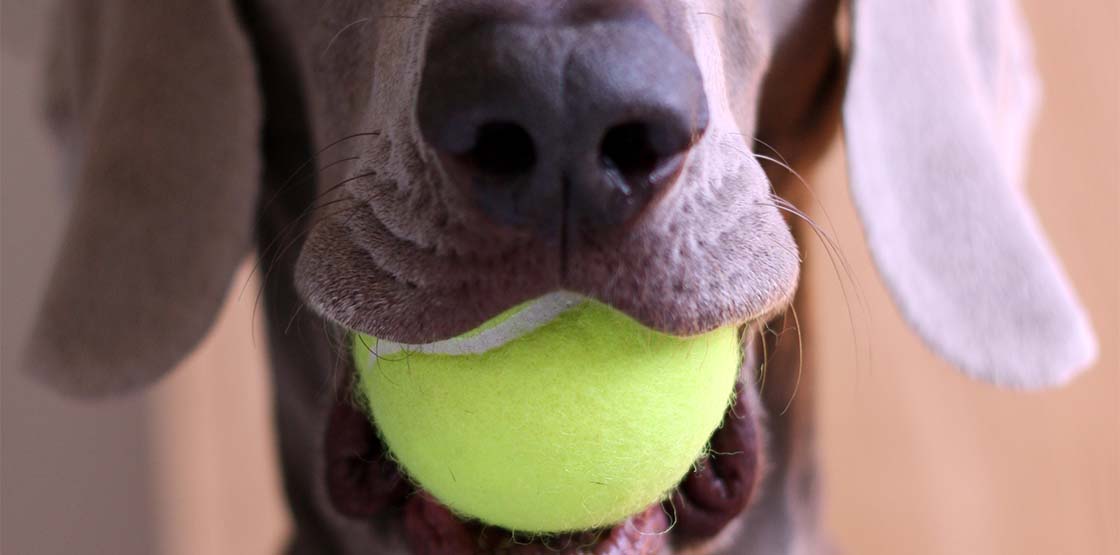Are Tennis Balls Bad for Dogs?
Tennis balls are commonly used as a toy for dogs. They're easy to get and many dogs love to chase them. Their size makes them easy to carry around and you might even have some laying around the garage. But, are tennis balls bad for dogs?
Tennis Balls as Toys for Dogs
Many dogs love to chase tennis balls. They tend to be lightweight and easy for owners to throw. They also bounce, which is perfect for encouraging dogs to chase them. They have been used for decades for dogs as a toy, but there are some definite health risks to using these balls. You can often find safer toys for pets in your local pet store or online: toys that are more durable and resist breaking down.
Pros of Using Tennis Balls
The main pro of using tennis balls when playing with your dogs is that they are inexpensive. You can get tennis balls at super stores, pet stores, athletic stores and more. If you have a local tennis club, you might even be able to get a bucket of tennis balls for next to nothing.
Tennis balls really bounce! In many cases, your playful pup will love to chase them around the yard or across the open field. They are a great way to keep your dog fit and healthy.
If you go to the lake or pool, they also float, so you can toss them out and have your dog swim to fetch them, making them a very versatile play toy.
Cons of Using Tennis Balls
Unfortunately, there are some real health hazards to playing with tennis balls. While many medium-sized dogs and smaller dogs will not readily choke on a tennis ball, larger dogs can. If your dog is a voracious chewer and bites into the tennis ball, small pieces can become lodged in the back of their throat. Unfortunately this can be deadly, such as in the case of Oprah Winfrey's dog, Gracie.
As your dog chews on a tennis ball, they can unravel the felt covering of the ball or break off pieces and ingest them. These parts of the toy can cause more than choking hazards; they can also cause intestinal blockages that need surgery to correct because they do not break down in the intestines.
Another main disadvantage of using a tennis ball is the potential for wear and tear on your dog's teeth. The outer covering of the tennis ball is typically very abrasive. As you toss it around the yard and your dog gets saliva on it, it can also trap in debris, making it very much like sandpaper on your dog's teeth. As they chew on the ball, the tennis ball can wear away at their enamel, potentially exposing the pulp cavity and causing your dog pain when they chew. It may even lead to dental infections and the need for dental extractions.
You May Also Like:
Related Search Topics (Ads):
Considerations When Playing With Tennis Balls
If you choose to let your dog play with tennis balls, you need to supervise them carefully. Don't let them run around the yard with a tennis ball in their mouth if you are not out there with them. You need to be able to intervene and get them to a veterinarian if they start choking. Also, make sure that you only play with one ball at a time. If you are tossing more than one ball, your dog might try to carry multiple in their mouth, which can increase the risk of choking on a ball.
When you and your dog are playing with tennis balls, monitor them carefully and make sure they are not chewing on the balls. Carrying them to play fetch is one thing, but a dog trying to chew on a tennis ball is a recipe for disaster.
Inspect tennis balls carefully before and after playtime. If the ball is damaged or dirty, replace it with another one. If your dog is a heavy chewer, consider getting another type of toy for them to play with. Many companies make sturdy rubber balls designed for vigorous chewers without the felt covering that can so easily become dirty or damaged and abrasive with a tennis ball.
In Summary
If your dog likes to chase tennis balls or you need an easy and inexpensive toy, tennis balls can be a great adjunct to your playtime. You need to monitor your dog and the ball carefully, ensuring that your dog does not chew on the ball and that the ball is not falling apart during use.
Consider talking to your veterinarian as part of your dog's regular checkup about their chewing behaviors. They can examine your dog's teeth and see if they are having too much wear on them, which could lead to issues down the road. If your dog is a chewer, consider a better toy for them to mouth on then a tennis ball.

